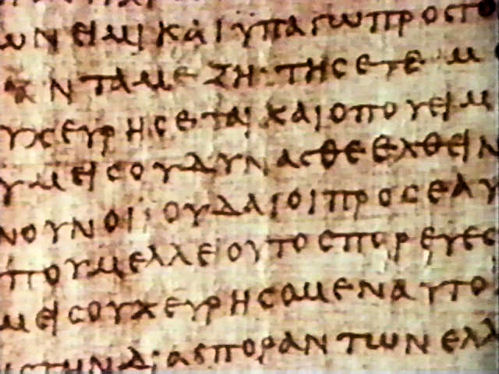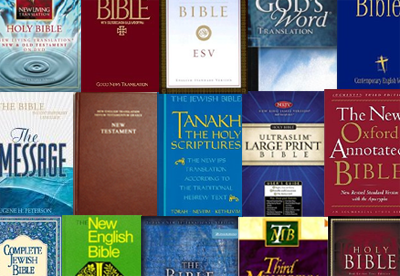Is the inspiration of Scripture taught in Scripture?
Maybe… Maybe not…
The primary text in Scripture used to support the doctrine of the Inspiration of Scripture is 2 Timothy 3:16.

The key phrase of this verse is most often translated as following:
All Scripture is inspired…
Seems pretty clear, right? So I guess that settles it. Scripture must be inspired.
Except that it’s not quite that easy.
The phrase is notoriously difficult to translate, and even more difficult to understand.
Translating 2 Timothy 3:16
First, the word “inspired” is a translation of the Greek word, theopneustos. The most literal translation might be “God-breathed” which is reflected in some translations. But even then, what does this mean? That Scripture is the breath of God? That Scripture was spoken by God? Even when translations use the word “inspired” what does that mean? How does it differ from being inspired by a beautiful sunset or piece of music?
Some note that the root of pneustos is pneuma, which is the word for wind, breath, or spirit. Based on this, some think of theopneustos as having something to do with God’s Spirit. In this way, Scripture is “God-Spirited.” But again, what does that mean?
As I indicated previously, this is the only time this word is used in Scripture, and is also quite rare in other Greek literature from that time, and so it is difficult to know exactly what Paul had in mind when he was wrote it.

A second translation issue is that the word theopneustos is an adjective, and so there is some question as to where in the verse to put the adjective, and how the adjective is being used.
As you probably know form English, there are numerous ways of using adjectives. It gets rather complex, but there are three main uses of adjectives. They can be used as adverbs, nouns, or to modify a noun. I am not going to try to explain all three, but there are translations of 2 Timothy 3:16 which reflect all three different uses of the adjective (See Greek Grammar Beyond the Basics by Daniel Wallace, pp. 291-314). I will point out some of these below.
Thirdly, there is the issue of the word “all.” This is the Greek word, pasa, which can also be translated “every.” So is Paul referring to all Scripture as in “Scripture in it’s entirety” or every Scripture as in “each, individual passage, verse, sentence, and word”?
Finally, there are translation issues with the word “Scripture” itself. The word is graphē which literally means “a writing” (singular). What “writing” is Paul referring to? In the immediately preceding verse (2 Tim 3:15), Paul has used the word grammata, which also means “writings.” Are the two synonymous or is Paul referring to something different with each word?
So, in the space of just three Greek words, we have four serious translation issues:
- What does the word theopneustos mean?
- As an adjective, how is it being used?
- How should we understand pasa in relation to Scripture?
- What is Paul referring to when he uses the word graphē?
Various Translations of 2 Timothy 3:16
Below are some of the ways the verse has been translated, with a few notes of my own following each translation, which explain what the translators seems to have been trying to say. (I recommend BibleWorks to get all of these versions and many more).

NAS / NLT / NRS – All Scripture is inspired by God
These translations seem to indicate a belief that Scripture in it’s entirety is inspired.
NIV – All Scripture is God-breathed
The NIV has translated theopneustos more literally.
KJV / NKJ – All Scripture is given by inspiration of God
It is interesting that the KJV and the NKJ add the phrase “given by.” It seems the translators were trying place extra emphasis on the divine origin of Scripture.
NET – Every Scripture is inspired by God
The NET translators apparently wanted to clarify that it is not just Scripture in it’s entirety that is inspired, but every individual part of Scripture as well.
ESV – Every Scripture is breathed out by God
The ESV also want to emphasize that individual Scriptures are inspired as well, and also tries to clarify that each Scripture was breathed out by God. Maybe they believed it was spoken by God?
ASV – Every Scripture inspired of God
Here is an example of a translation that seems to imply that some Scripture might not be inspired, and therefore, the uninspired Scriptures are not profitable. But how to know which is which?
NEB – Every inspired Scripture
As with the ASV, this translation seems to indicate that not all Scriptures are inspired.
YLT – Every writing is God-breathed
Here is an example of a translation that used “writing” instead of “Scripture” and also goes with “God-breathed.” The translator leaves it up to the reader to determine which writings are in view, and what “God-breathed” means.
What do you think?
Tomorrow we will dig in to 2 Timothy 3:16 a little deeper, and I will present a translation which I think fits the context better than any of the above and helps make much more sense of the text. This translation will pave the way for looking at other passages in the Bible which also seem to speak to the doctrine of the Inspiration of Scripture.
Until then, what are your thoughts on 2 Timothy 3:16? Do you have a preferred translation above? Why? Do you have your own translation which is not reflected above (or can you guess what mine might be)?




This verse is frequently cited to answer the question, “How do I know I can trust the Bible?” Answer: The Bible says it’s from God. This kind of circular logic is often ignored by Christians, but unbelievers quickly pick it up. When we look more closely at this passage, and ask the questions of it, as you are doing here, you can quickly see that it’s not the neat little package it’s often made out to be. Looking forward to see where you go with this topic.
Bob,
I’m finding more and more than almost nothing in life comes in a neat little package. Right?
Circular reasoning is not a problem when dealing with a primary source. Take for example a test for the eye. Does the eye see? Well we would use an eye to check this, because the eye is the primary source here.
It’s definitely Circular, however, in dealing with absolute truth, you will always come to a circuar type of reasoning. If Evolution is the truth about origin of life, than you would come to some type of conclusion that something is true “because Evolution says so” when you boil it down. IF the Bible is true you will come to a similar conclusion.
I believe that the entire Bible is inspired (and find it problematic to believe in if it were not). I even used this verse in one of my previous comments on in this “series,” (perhaps that is what got you looking into this verse?) and I still fully stand by it. It is possible that it is only referring to the OT, but if so, then that means we are only looking at the NT in terms of whether or not it is inspired.
If I could note one thing, it seems the one thing that is missing from this series is a personal prayer and petition to God asking him to help show you what is true. I think often times we become so consumed with knowledge and what seems “rational,” that we overlook that God is beyond logic and human rationality. So just because something is hard to believe to us, it doesn’t mean it isn’t true. (This goes for everyone, I do it too!)
Lastly, inspiration of scripture hits very close to home for me. I am currently a college student getting a degree in philosophy and religion, and am in a department full of atheists and agnostics (professors included). I have seen all of the “secular” beliefs of how the bible came to be written and canonized, and can attest to the dangers and how simply un-authoritative the bible becomes if it is in fact not inspired by God. I know that if I did not bible that the bible was both infallible and inerrant, I would not believe in it.
I wouldn’t spend too much time on this verse though, it played little to no part in me coming to believe that the bible was inspired by God. Although I would say that even if there is only one time the Bible uses this type of wordage to argue for inspiration by God, there aren’t any verses that argue that it wasn’t inspired by God.
I hope you don’t find me to be too pushy on this subject! You’re making me go back and look over this stuff as well, I find this edifying in that way.
Dylan,
Thanks for the comment.
Everything I do and write is bathed in prayer, so to speak. I just don’t post such things on my blog. And I was planning on dealing with 2 Tim 3:16 from the very beginning of this series, as well as a few other texts.
Now that I have posted about /2 Timothy 3:16, do you see where I am coming from a bit more?
You are studying a very tough field, and I hope that your faith can remain firm as you progress.
I am absolutely with you on this. I believe that everything in the scripture is inspired by God. No ifs or buts.
This link http://kukis.org/Inspiration/StudyInspiration.htm has enough information about the mentioned subject to choke a mule
Ha ha! I’ve never heard that expression before.
In response to Anthony, you are right about the amount of information contained, would choke a mule. It is a small book at least. Blessings
For folks who can’t afford BW, (which is quite High..I only have BW8) I also recommend The Word, which is free. It’s the replacemnt and improvement of ESword.
http://www.theword.net
I also have over 500 plugins if anyone is interested in them.
Excellent. I didn’t know about this.
Also, I have used “E Sword” as well, which is also free.
I think Blue Letter Bible has some good resources as well.
pasa graphe theopneustos kai ophelimos pros didaskalian
every/all WRITing god-spirited and beneficial toward teaching
pros elegchon pros epanorthosin pros paideian ten en dikaiosune
toward EXPOSing toward on-up-erecting toward discipline the in JUSTice
[c.f.SOFTWARE: scripture4all.org ]
MY FIRST QUICK DRAFT:
In many other passages ”panton” is used for ALL. I favor the word”every” and for graphe I use ”verse”, thus ”Every verse’. Now the appearent difference between Paul’s use of two different types of the words for ”writings” (graphe and grammata) becomes clear when we see Paul clarify the difference when he uses hiera ”sacred”.
In verse 15 Paul refers to the whole ”Sacred Writings” and does not use the word ”pros”. The ALL is intrinsic to the whole Hebrew canon. But, in verse 16, Paul appears to press the issue I believe down to the very verse level. Thus, without a doubt, the whole of the canon down to the very phrases themselves, are to be understood as ”God-Spirited”. Now, it is not the ”Letter” but the ‘spirit’ of the Letter; not the word or vehicle but the ”meaning” of each word. Hence, we see now why many verses are read for years without understanding until the reader is enlightened by Him. The Letter read with the mind kills, but the Letters (words) read with the leading-spirit of God brings life. When Canonical verses are studied God leads the reader to be driven TOWARD being taught, convicted (exposed to truth), Up-erected (corrected), and disciplined in the [His Divine] JUSTice.
There are several problems in the text:
First: translation of the book in which every doubt and the right of each book, not the whole book “πασα γραφη”.
Second: Paul Timothy say: “and you since childhood,” indicating that the intentional Paul Old Testament only because the New Testament was not written at the time and this is a testimony of Paul that infallibility in his talk about the Old Testament alone.
Third, even Paul certificate of the Old Testament offset problem in very different legal Old Testament
Jafar,
I am having trouble understanding your comment, and so cannot respond adequately. Sorry!
Hello,
I realize this is an old thread…but you and the responders sounded very knowledge about the subject and I had questions concerning the topic of “Word of God”/ “God Breathed” /”God Inspired”……….so I will give it a shot…
I have several questions…but I cannot ask some yet…because your response to the following questions…..determines what the next questions will be….
Could someone please give a clear and concise definition of the following terms….less than 10 words if possible for each:
“Scripture”
“The Bible”
“The Word Of God”
“God-Inspired”
My first question beyond the above request to have those words defined is….
Is the “entire” Bible purported to be the “Word of God” OR are only “some” of the passages in the Bible the actual Word of God and the rest may be considered inspired by God?
Thanks to anyone who replies!
Tom
Great questions! Isn’t it amazing that we talk about whether or not “the Bible” or “Scripture” is inspired without having a good working definition of what the Bible is? We all assume we know what the Bible is, but maybe we don’t….
Here’s how I understand the meanings of those terms:
Scripture:
writing, usually pertaining to religion
The Bible:
anthology of specifically Christian-oriented religious scripture
The Word of God:
1) words actually spoken or written by God
2) God’s spirit, consciousness, creative will and/or “being” (“Logos,” as used in the Gospel of John)
God-inspired:
1) resulting from a consideration of God
2) resulting from a personal experience of God.
3) resulting from a direct communication from God.
The definition of “logos” has varied according to the context in which the word was used. See the Wikipedia article on Logos for more on that.
The entire Bible is purported by many to be the “Word of God” according to the first definition. Others believe that only some passages are the actual words of God. Still others believe that the Bible is God-inspired. Many people don’t believe that inspiration by God according to definitions 2 or 3 is possible.
Personally, I believe that the books of the Bible are all God-inspired by definition 1, and many by definition 2. I have my doubts about definition 3, at least as regards verbal communication.
My rather uneducated stab at a paraphrase would include the preceding verse to make more sense of it in context as follows (borrowing partly from the ESV here):
“… and how from childhood you have been acquainted with the sacred writings, which are able to make you wise for salvation through faith in Christ Jesus. Indeed, all God-inspired writings are profitable for teaching, for reproof, for correction, and for training in righteousness,…”
thus linking the verses by means of a progression of thought, from the writings Timothy is acquainted with to then include further writings that are about spiritual matters. This does not require the introduction of a new idea (special Inspiration), nor does it seek to define boundaries around a specific set of writings (the sense of the passage doesn’t seem to warrant that), and the verses can be taken together to be simply an encouragement to Timothy to continue the practices of reading spiritual writings that he began as a child. (It is worth noting that even the OT canon had not been fixed by this time, so drawing boundaries around certain books and calling them “Scripture” (with a capital S) would seem to be a later reading onto Paul’s intention here?
As I said… just my uneducated thoughts on the matter.
This view is actually held my many scholars and authors. This sort of reading says that non all “scripture” is inspired, but that which is inspired is helpful for …
The difficulty then, of course, is trying to determine what is inspired and what is not?
Obviously, Paul was speaking about the “Old” Testament when he wrote 2 Tim. 3:16. But did he even think that what he was writing would be “future scripture”? Was he inspired to write everything we have recorded in the “New” Testament?
It doesn’t sound like it.
“But this I say by way of concession, not of command.” (1 Cor. 7:6 — all NASB)
“But to the rest I say, not the Lord, …” (v. 12)
“Now concerning virgins I have no command of the Lord, but I give an opinion …” (v. 25)
“But in my opinion … ” (v. 40)
“Are they servants of Christ?—I speak as if insane—…” (2 Cor. 11:23. I don’t think inspiration comes from even from facetiousness about insanity.)
“I want…” (1 Tim. 2:8)
“But I do not allow … ” (v. 12)
Paul may have been inspired in most of his writing, but he certainly insinuated himself into much of it.
Inspired? I can only take him with a grain of salt except when he says, “The Lord says…”
Excellent insights! I think there are ways to argue that Paul thought that maybe he was writing inspired Scripture, BUT, I don’t know if he would have agreed with some of the modern definitions of “inspiration = inerrancy.” I personally believe in inerrancy, but my view is a bit more nuanced than others who also hold to it…
I believe in the inerrancy of the Scriptures also — of the “autographs.” However, since we don’t have any autographs of Scripture, the hand of man is involved, and there is not a copy of any book in the Bible without errors, especially translations. Every translation is, by definition, an interpretation with every interpreter injecting his own biases into it.
The ideas expressed in the Hebrew “Old” Testament are valid, since there are fewer mistakes than in any translation, and I believe that the entire Bible is the true, infallible, reliable, eternal Word of God, but unless we’re able to read Hebrew and think like the Hebrew writers, we must rely on man’s definitions of Hebrew words.
I am not a Bible literalist, I would say that ‘theopneustos’ just means what it means in common English, ‘inspired’. Theos (God ) and Pneuma (Breath/ Wind/ Spirit) go together and come to the imagination like God breathing over the scripture thus ‘inspiring’ the Words. The reason for this is that God puts some of his Own inside the scripture, just as he breathes Adam into his nostrils and he became a living soul (Genesis 2:7). It’s a similar thing. Having said that, for example if I inspire you to write a book, then you will use my words, my thoughts, my vision, but the words you write are still your own. Some match my exact ideas, others less. If the complete scripture, that was not even finished when Timothy was written (!) is 100% of God, the authors would have taken different Greek words. The fact that this word is an adjective also makes it less likely to mean some form of the word ‘complete’ was meant by the authors. (Jesus is another case though since Jesus is the ‘living Word’ He just writes the scripture as it is when He is on earth 🙂
The NIV has ‘Scripture’ while the KJV has ‘scripture’ for 2 Tim 3:16. This distinction shows that the Greek word graphe was not any old writing but “specific” writings of the so called ‘Old Testament’ which makes it a proper noun, thus the capitalization. There can be no doubt that most people misquote this verse to cover the whole Bible. That is not a good use of the Bible. It is good to study and when you face the truth, don’t try to bend it your way.
Not all of the Bible authors claimed direct inspiration of God. For instance, Proverbs is presented as a collection of wisdom sayings brought together by Solomon.
And secondly, not all of scripture represents God’s value system either. A reading of judges shows how men acted by their own inspiration and missed the mark time and again. In what way is that inspired by God?
Paul certainly did not regard the entirety if his own letters to be inspired by God and might have protested the act of including them as Holy Writings in the Bible! How much of his letters were inspired by God and how much not? Paul does not always indicate and some of his key of his arguments remain open ended and unexplained.
Furthermore the question remains how much of the Old Testament Paul had access to and which scriptures he referred to. As parchment came at a stiff price and writing was a most expensive item, most synagogues at the time had only a few scrolls to study and apart from the temple at Jerusalem it is dubious that anyone had the full collection of Old Testament writings. besides which there is mention of scriptures in the Bible that are no longer available or today regarded as psuedographia.
I would certainly like to know what your own conclusions on the matter is.